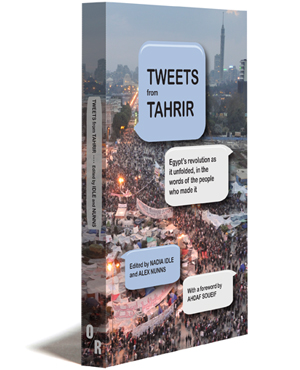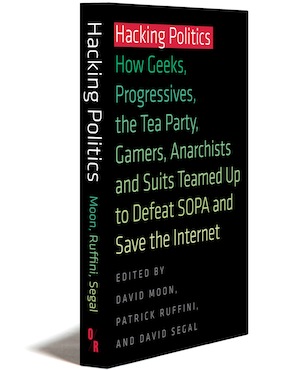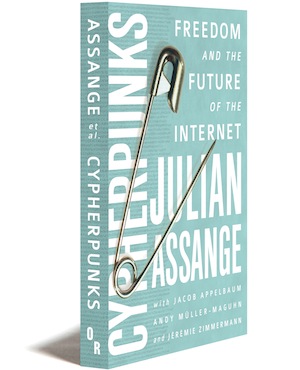The Internet, twenty-five years later
On August 6, 1991 Tim Berners-Lee launched the world’s first website for CERN, European Organization for Nuclear Research. Today, there exist more than one billion sites on the World Wide Web and more than three billion Internet users. In those twenty-five years, the Internet has grown in ways that could not have been foreseen two and a half decades ago. OR Books has documented the history of the Internet, from its breakthroughs to its failures, its expectations to its realities, its triumphs to its present dangers.
———————————————

|
@heaven: THE ONLINE DEATH OF A CYBERNETIC FUTURIST 1994, northern California. The Internet is just emerging from military and university research labs. Groups of idealistic technologists, recognizing its potential as a tool for liberation and solidarity, are working feverishly to build the network. In an early chat room, The WELL, a Stanford futurist named Tom Mandel creates a new conference asking for advice shaking off a persistent hacking cough. Within six months he is dead. @heaven opens a window onto the way the Internet functioned in its earliest days. This electronic chronicle of a death foretold reminds us of the values of kinship and community that the Internet’s early pioneers tried to instill in a system that went on to take over the world. |

|
SPLINTERNET by Scott Malcomson There’s always been something universalizing about the Internet. The World Wide Web has seemed both inherently singular and global, a sort of ethereal United Nations. But today, as Scott Malcomson contends in this concise, brilliant investigation, the Internet is cracking apart into discrete groups no longer willing, or able, to connect. The implications of this shift are momentous. “This is not your ordinary history of the Internet. Scott Malcomson has brilliantly extended the connections between Silicon Valley and the military back far beyond DARPA—back, in fact, to World War I. If you want to understand the conflict between cyberspace utopians and the states and corporations who seek to dominate our virtual lives, you’ve got to read this book.” —James Ledbetter, editor, Inc. Magazine |

|
LEAN OUT edited by Elissa Shevinsky Lean Out collects 25 stories from the modern tech industry, from people who fought GamerGate and from women and transgender artists who have made their own games, from women who have started their own companies and who have worked for some of the most successful corporations in America, from LGBTQ women, from women of color, from transgender people and people who do not ascribe to a gender. All are fed up with the glacial pace of cultural change in America’s tech industry. “Disconcertingly thought-provoking.” —TechCrunch |

|
TWEETS FROM TAHRIR edited by Nadia Idle and Alex Nunns The Twitter accounts of the activists who brought heady days of revolution to Egypt in January and February this year paint an exhilarating picture of an uprising in real-time. Thousands of young people documented on cell phones every stage of their revolution, as it happened. This book brings together a selection of key tweets in a compelling, fast-paced narrative, allowing the story of the uprising to be told directly by the people in Cairo’s Tahrir Square. “Deeply moving, a record of great courage, mostly by young people, facing Mubarak’s legion of goons and regime thugs.” —Robert Fisk, The Independent |

|
HACKING POLITICS edited by David Moon, Patrick Ruffini and David Segal Hacking Politics is a firsthand account of how a ragtag band of activists and technologists overcame a $90 million lobbying machine to defeat the most serious threat to Internet freedom in memory. The book is a revealing look at how Washington works today – and how citizens successfully fought back. Written by the core Internet figures—video gamers, Tea Partiers, tech titans, lefty activists and ordinary Americans among them—who defeated a pair of special interest bills called SOPA (“Stop Online Piracy Act”) and PIPA (“Protect IP Act”), Hacking Politics provides the first detailed account of the glorious, grand chaos that led to the demise of that legislation and helped foster an Internet-based network of amateur activists. |

|
THE BIG DISCONNECT by Micah L. Sifry Now that communication can be as quick as thought, why hasn’t our ability to organize politically—to establish gains and beyond that, to maintain them—kept pace? The web has given us both capacity and speed: but progressive change seems to be something perpetually in the air, rarely manifesting, even more rarely staying with us. “No one better grasps the interplay between innovative media technology and politics than Micah Sifry.” —Kevin Phillips |

|
BLACK OPS ADVERTISING by Mara Einstein From Facebook to Talking Points Memo to the New York Times, often what looks like fact-based journalism is not. It’s advertising. Not only are ads indistinguishable from reporting, the Internet we rely on for news, opinions and even impartial sales content is now the ultimate corporate tool. Reader beware: content without a corporate sponsor lurking behind it is rare indeed. “Reading Mara Einstein is like putting on magic glasses that let you see the advertising all around you, all the time. Whether you’re looking to sell, or hoping to resist, here is the state of the art.” —Douglas Rushkoff, author, Throwing Rocks at the Google Bus, Present Shock |
———————————————
Further Reading

WHAT’S YOURS IS MINE
Against the Sharing Economy
In What’s Yours Is Mine, Tom Slee argues that the new wave of companies known as the sharing economy, including tech giants Lyft, Airbnb, Taskrabbit, and Uber, is funded and steered by very old-school venture capitalists. More |

BEYOND ZERO AND ONE
Machines, Psychedelics, and Consciousness
Can we build a robot that trips on acid? Is the human brain based on computation? In Beyond Zero and One, Andrew Smart challenges fundamental assumptions underlying artificial intelligence and convincingly makes the case that the answer lies beyond the computational. More |

WHEN GOOGLE MET WIKILEAKS
Julian Assange and the chairman of Google Eric Schmidt debate the political problems faced by society, and the technological solutions engendered by the global network—and outline radically opposing perspectives. More |

CYPHERPUNKS
Freedom and the Future of the Internet
Julian Assange brings together a small group of cutting-edge thinkers and activists from the front line of the battle for cyber-space to discuss whether electronic communications will emancipate or enslave us. More |

TECHNOCREEP
The Surrender of Privacy and the Capitalization of Intimacy
Technocreep is the definitive dissection of privacy-eroding and life-invading technologies, coming at you from governments, corporations, and the person next door. More |

PROGRAM OR BE PROGRAMMED
Ten Commands for a Digital Age
“Thinking twice about our use of digital media, what our practices are doing to us, and what we are doing to each other, is one of the most important priorities people have today… Read this before and after you Tweet, Facebook, email or YouTube.” —Howard RheingoldMore |

THE UNITED STATES VS. PVT. CHELSEA MANNING
A Graphic Account from Inside the Courtroom
Drawing in real time from inside the courtroom, artist and WikiLeaks activist Clark Stoeckley captures the extraordinary drama of The United States vs. Pvt. Chelsea Manning, one of the most secretive trials in American history. More |

AUTOPILOT
The Art & Science of Doing Nothing
A survivor of corporate-mandated “Six Sigma” training to improve efficiency, Smart has channeled his “loathing” of the time-management industry into a witty, informative and wide-ranging book that draws on the most recent research into brain power. Use it to explain to bosses, family, and friends why you need to relax – right now. More |

FREELOADING
How Our Insatiable Appetite for Free Content Starves Creativity
Freeloading is a book that takes a critical look at a near-pervasive phenomenon that involves almost everyone who taps a keyboard: beyond that, it’s a reminder of the truism that for every action there are consequences. What happens when we pirate a favorite work of art? And what, if anything, should be done about it? More |

The Passion of Bradley Manning
The Story of the Suspect Behind the Largest Security Breach in U.S. History
“The mistreatment, trial, and fate of Private Bradley Manning will undoubtedly read like an obituary on the Obama years… Essayist and lawyer Chase Madar turned his sharp eye on it early. His will be the single must-read book on the case.” —Tom Engelhardt More |

WIKILEAKS AND THE AGE OF TRANSPARENCY
“A report from the trenches where a wide array of small-d democracy and transparency activists are hard at work…using new tools and methods to open up previously closed and powerful institutions and make them more accountable.” —from the author’s introduction More |


